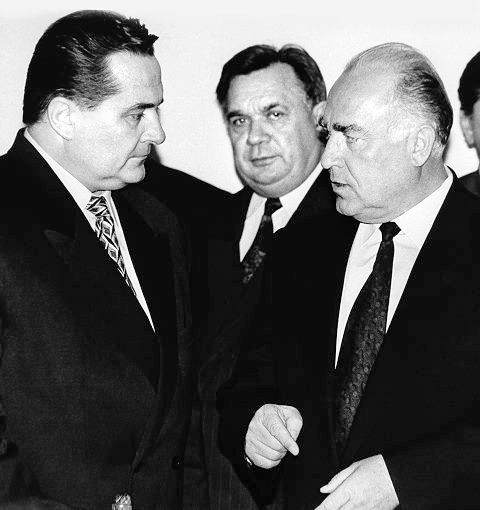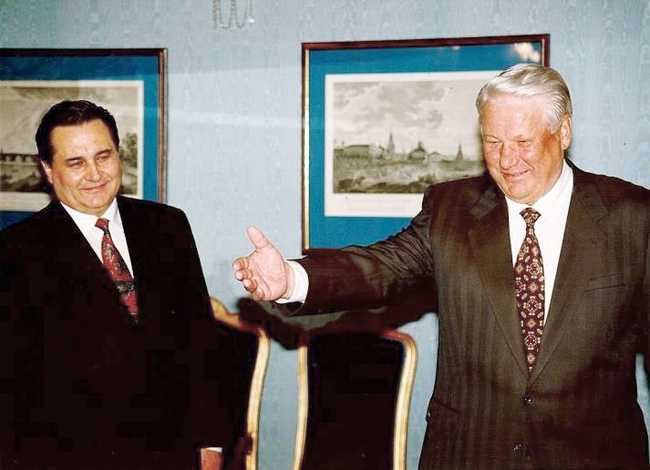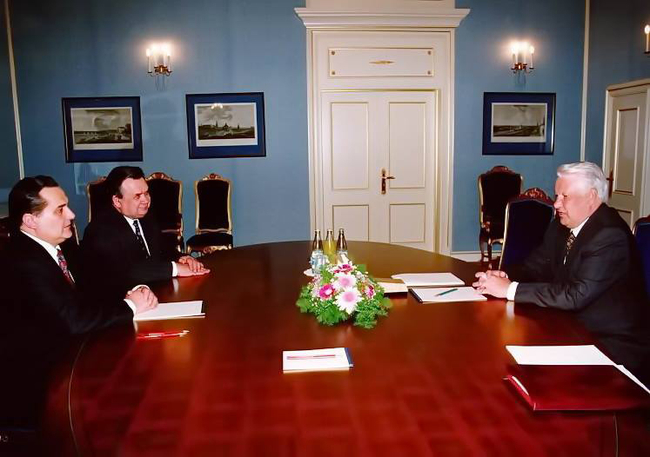The price of a Kremlin word
Yevhen MARCHUK: “17 years after Ukraine and Russia had signed a comprehensive treaty, Putin flagrantly violated this basic document – and not only this one”
It was 20 years the other day since Ukraine and Russia signed the so-called comprehensive treaty which laid down the fundamental principles of the two states’ official relations. Russia’s war against Ukraine is in its fourth year, Crimea and a part of the Donbas are occupied (Russia admits this fact, as far as Crimea is concerned), more than 10,000 Ukrainian citizens were killed and still more remain disabled, more than a million Ukrainians were forced to migrate, lost their housings, and suffered other losses.
Russia’s foreign ministry made a cynical statement the other day, which says that Ukraine-Russia relations are “far from the Treaty’s spirit and letter.” It claims that this was caused by the “2014 coup d’etat in Kiev” and “totally unfriendly steps of the current Kiev authorities.” As a classic said, “You are to blame just because I’m hungry.” The symptoms of an aggressor were evident as far back as the early 1990s. The proof of this can be found in a series of debates on the Treaty’s content.

KYIV, FEBRUARY 8, 1995. THE HEADS OF THE OFFICIAL DELEGATIONS OF UKRAINE AND RUSSIA INITIALED A DRAFT GENERAL POLITICAL TREATY BETWEEN THE TWO COUNTRIES. RUSSIAN VICE PREMIER OLEG SOSKOVETS AND HIS UKRAINIAN COUNTERPART YEVHEN MARCHUK AFFIXED THEIR SIGNATURES TO THE DOCUMENT. MARCHUK AND SOSKOVETS ALSO SIGNED INTERGOVERNMENTAL AGREEMENTS ON FREE TRADE AND STATE BORDER CHECKPOINTS, THE PROTOCOL ON IMPLEMENTING THE REEXPORT AGREEMENT, AS WELL AS AGREEMENTS ON MERCHANT SHIPPING AND DOUBLE TAXATION AVOIDANCE (INTERFAX.COM.UA)
The Day has had an interview with Yevhen Marchuk, former Prime Minister of Ukraine (1995-96), ex-chairman of the Security Service of Ukraine (1991-94), representative of Ukraine in the security subgroup of the Trilateral Contact Group in Minsk. Marchuk directly participated in drawing up this document and conducted the decisive talks about the final approval of it at the level of both countries’ presidents.
“THE DISPUTES WERE SO HEATED THAT THEY HINDERED THE WHOLE WORK ON THE TREATY”
Mr. Marchuk, as far as The Day knows, you not only took part in drawing up what is known as Treaty on Friendship and Partnership between Ukraine and the Russian Federation, but also played a key role in upholding this document’s crucial provisions which Russia was unwilling to accept. Now that the war has been going on for three years, the commitments and responsibility of Russia is a question of paramount importance.
“I and Oleg Soskovets (who replaced Yury Dubinin) headed the Ukrainian and Russian sides, respectively. What is popularly known as Comprehensive Ukrainian-Russian Treaty is also unofficially called basic. This treaty lays down almost all the basic components of interstate Ukrainian-Russian relations after the collapse of the USSR. Besides, as lot of other, more particular and specialized, treaties were drawn up, discussed, and signed. The basic treaty as such regulates the principles of interstate relations between Ukraine and Russia as independent states. The difficulty was that, concurrently with the basic treaty, several agreements on the partition of the Black Sea Fleet, Ukraine’s gas debts to Russia, and a number of agreements on cooperation in various fields, were also being drawn up.”

MOSCOW, APRIL 18, 1995. DISCUSSION OF THE BLACK SEA FLEET PROBLEM. UKRAINE’S ACTING PREMIER YEVHEN MARCHUK SAID AT THE PLENARY MEETING BEFORE THE NEGOTIATIONS THAT BOTH SIDES “CAN MAKE ESSENTIAL, MAXIMAL PROGRESS IN THIS PROBLEM.” IN HIS VIEW, IF THE TWO SIDES “WORK WELL,” THEY WILL BE ABLE TO ACHIEVE A “95-PERCENT SOLUTION OF THE PROBLEM.” RUSSIA’S VICE PREMIER SOSKOVETS, THE HEAD OF THE RUSSIAN DELEGATION, POINTED OUT THAT THE RUSSIAN SIDE INTENDED TO GET BACK TO TWO ARTICLES OF THE INITIALED TREATY ON FRIENDSHIP AND COOPERATION, NAMELY, THE ARTICLES THAT DEAL WITH THE SETTLEMENT OF THE TWO COUNTRIES’ BORDER ISSUES AND THE QUESTION OF CITIZENSHIP. A MEETING WITH RUSSIA’S PREMIER VIKTOR CHERNOMYRDIN IS ALSO PLANNED (INTERFAX.COM.UA)
What questions were the most debatable?
“There were a lot of discussions. It took almost three years to draw up the treaty. I began to supervise this work when I was appointed First Vice-Prime Minister of Ukraine. It was very difficult to work on this treaty. Here are just two examples. When we finally almost finished the work on this treaty and Russian First Vice-Premier Soskovets and I initialed it, Russia began to insist that the provision of dual citizenship in Ukraine be included and the article on the interstate border be essentially revised. Russia began to insist on withdrawing only one word from Article 2 which said that the two sides ‘shall respect the territorial integrity of each other and uphold inviolability of the existing borders.’ So they were against the word ‘uphold.’”
So they respect but do not uphold inviolability…
“As for citizenship, Russia wanted Ukraine to keep intact the provision on dual citizenship in the interests of the Russian-speaking population and ethnic Russians. Naturally, we could in no way accept this, for it ran counter to the Ukrainian law. But the Russians were pressing, as if taking care of their compatriots. They meant by compatriots not only the Russian-speaking population, but also ethnic Russians. It was a tradition in the Soviet era to settle retired servicemen (above all, naval officers) in Crimea. This approach resulted in a large number of Russian retired servicemen’s families living on the peninsula. The disputes were sometimes so heated that they hindered the whole work on the treaty, but still we managed to reach a compromise on many points. We were practically finishing the work on the treaty and even initialed it, but the two abovementioned issues completely blocked the document which was almost ready to be signed. It is Russia that balked at these points.”
“STRETCHING OUT HIS HAND FOR ME TO SHAKE IT, YELTSIN DECIDED TO PULL IT, BUT I DIDN’T LET HIM DO SO”
So Crimea was the heart of the matter, as was the question of dual citizenship and of “upholding the inviolability of borders.” What reasons did the Russian side give for taking its position on the borders?
“As for ‘upholding the inviolability of borders,’ the Russians would make all kinds of excuses, such as: there is a border, so why should we insist on the ‘inviolability of borders,’ for this will require a new border policy, and so on. We were about to hold the last round of talks. I am in Moscow for negotiations. Soskovets and I lead the Russian and Ukrainian delegations, respectively. We reached a deadlock over these two points. During the break, I meet Viktor Chernomyrdin and tell him that it is not very wise to hamper the work on the treaty because of these two points. Chernomyrdin says to me: ‘Mr. Marchuk, I can understand you, but you should understand me, too.’ He thus made it clear to me that this does not depend on him. I got the hint and asked: ‘And what if I ask to bring me in touch with Yeltsin?’ He nodded. We have a break again, and I phone President Kuchma in Kyiv, asking him to arrange my meeting with Yeltsin. The problem can be solved today, so why not try to persuade Yeltsin? Half an hour later, Leonid Kuchma says the meeting was arranged. The meeting took place on the same day. I am with the Ukrainian Ambassador to Russia, Volodymyr Fedorov, and Yeltsin is accompanied by his advisor Dmitry Ryurikov. And interesting episode occurred there. A few years before, Kuchma had visited Moscow as President of Ukraine. Yeltsin was in the habit of showing himself as No. 1 in negotiations. He liked making buddy-buddy gestures in front of TV cameras, as if he were a big brother. There seems to be nothing bad or insulting in hugging, but he thus demonstrated an ostensible domination. I knew this feature of Yeltsin. So when a TV cameraman and then Yeltsin with Ryurikov came into the room, Yeltsin showed in a very friendly way that he recognized me because he had seen me during the previous talks. But, stretching out his hand for me to shake, he decided to pull it. And I in turn flexed my right hand’s muscles as hard as possible and didn’t let him draw me over to him. Of course, I did not show why I did so, but Yeltsin grinned a little and cast a slightly cool glance at me, as is saying: ‘OK then.’ Yet this warded off the ‘big brother’s’ condescending hugs.”

MOSCOW, APRIL 18, 1995. RUSSIAN PRESIDENT BORIS YELTSIN ENDORSES THE INITIALED TREATY BETWEEN UKRAINE AND RUSSIA. ACCORDING TO YEVHEN MARCHUK, THE TREATY’S TEXT KEEPS INTACT THE WORDING OF THE PARAGRAPH ON THE BOUNDARIES PROPOSED BY THE UKRAINIAN SIDE, WHICH SAYS THAT “THE TWO SIDES SHALL RESPECT THE EXISTING BORDERS OF EACH OTHER AND ACKNOWLEDGE THEIR INVIOLABILITY” (INTERFAX.COM.UA)

Now, on the international arena, even ordinary people could see this technique on the example of Trump’s handshakes.
“Yeltsin began the conversation with putting the blame on our side. He was expected at the time to visit Ukraine for signing this treaty. The treaty had already been initialed but not yet signed by the presidents and, therefore, could not be submitted to our parliaments for ratification. I explained to Yeltsin our attitude to dual citizenship, and he finally agreed. Then he turned to the abovementioned inviolability of borders or, to be more exact, to the word ‘uphold.’ ‘We are fraternal peoples!’ Yeltsin says. ‘So why should we tell the whole world that we uphold the inviolability of borders? I’ve always been saying that Crimea is part of Ukraine.’ Incidentally, the borders were not delimited or demarcated at the time. Then I say: ‘Why then does this formula – ‘upholding the inviolability of borders’ – occur in Russia’s treaties with Kazakhstan, Belarus, and even Tajikistan which does not border on Russia? Why then should this word be missing in the treaty with Ukraine?’ Yeltsin looked at Ryurikov who had not perhaps warned his president about this point. I add: ‘Moreover, Mr. President, in 1990, well before the aborted putsch, you, as President of the still Soviet Russian Federation, signed in Kyiv the Ukrainian-Russian Treaty which contained this very formula.’ At the time, Russia was the first Soviet republic to make a declaration on political sovereignty, and the idea of forming a confederation instead of the Soviet Union was in the air. I say: ‘It is a generally-accepted formula in respectable states.’ Yeltsin was in the habit of suddenly falling silent at negotiations in order to mull over a problem. Here, too, he stopped talking and frowned. There was a pause. Then he turned to his advisor and said: ‘Ryurikov, you’re a bureaucrat, aren’t you?’ Of course, Yeltsin was playacting to some extent, but then he said: ‘All right!’ So he agreed. Of course, it is a very shortened and simplified version of those talks. Incidentally, the conversation lasted for 40, instead of the planned 20, minutes. But still a lot of time passed even after this solution of the problem. The negotiations on the partition of the Black Sea Fleet were very difficult. So the treaty was signed only two years later, when Yeltsin arrived in Ukraine.”
“THE RUSSIAN POLITICAL TOP HAS BEEN REJECTING THE PRINCIPLE OF UPHOLDING THE INVIOLABILITY OF BORDERS SINCE THEN”
Why were the Russians dragging their feet so long about the world “uphold”? They might have had intentions even at the time to violate our borders?
“Well after Boris Yeltsin’s death, the Russian diplomatic ‘hawk’ Yury Dubinin, who had taken part in those negotiations, even wrote an article, ‘How the Black Sea Fleet Was Partitioned,’ in which he said that Yeltsin and, even more, Soskovets had made unjustifiable concessions to Ukraine. I do not rule out that Yeltsin himself supported the idea of dual citizenship in Ukraine. But the intention to avoid ‘upholding’ the inviolability of borders contained a warning for the future.
“Seventeen years later, Russian President Putin flagrantly violated this basic Ukrainian-Russian treaty – and not only this one. This explains to a large extent the fact that the Russian political top has been rejecting the principle of upholding the inviolability of borders since then. Georgia in 2008 and Ukraine in 2014 are ample proof of this.”
Does this mean that all the similar treaties Russia has signed with the former USSR republics in fact give no guarantees of security to these states on the part of Russia?
“Putin has violated all the principles of international security. Therefore, for example, now that Kazakhstan has switched to the Latin alphabet (add to this a very difficult border with Russia, which has almost not existed before), anything can happen.”
So this treaty, like all the other ones that Russia signed, has not become an effective protector against Russian aggression.
“After ratification, this international agreement was sent to the UN Security Council, where it is kept as the two countries’ basic interstate treaty. But for this treaty, the IMF would not have opted for full-scale cooperation with Ukraine. Ukraine and Russia emerged from the same country, the USSR, and they inherited a host of complicated problems. I can remember well that, just in a minute, we informed by phone our delegation at the IMF headquarters that Marchuk and Soskovets, heads of the Ukrainian and Russian governmental delegations, had just initialed the treaty. The latter was also of great importance because in case of any dispute over any matter this treaty could be appealed to.
“As for Bismarck’s words that no treaty with Russia is worth the paper it is written on, I must say: all treaties are signed on paper. There is no other way to officially regulate interstate relations. Lavrov once said that the Budapest Memorandum only envisaged the absence of a nuclear threat from the guarantor countries. I then commented on television: nothing of the sort, we must recall the memorandum’s text which says clearly: ‘The United States of America, the Russian Federation, and the United Kingdom of Great Britain and Northern Ireland reaffirm their obligation to refrain from the threat or use of force against the territorial integrity or political independence of Ukraine, and that none of their weapons will ever be used against Ukraine except in self-defense or otherwise in accordance with the Charter of the United Nations.’ Russia does not care a damn about this international document either.”
Can we refer to this treaty if we sue Russia at the International Court as part of a legal struggle against the aggressor?
“We can, but this requires making strenuous efforts to gather the irrefutable evidence of Russian aggression, which would counter Russia’s opposition at the International Court, as well as to assess, through a not so simple procedure, the losses the Ukrainian state and citizens have suffered as a result of this aggression. Many other things need to be done. Very many.”
Do you think Russia would have committed aggression against Ukraine if Yeltsin had transferred power to Chernomyrdin, not to Putin, in the same way?
“Never. There might have been some problems, but not the war and annexation of Crimea. But Ukraine should also have done very much in this period to strengthen its security.”
Newspaper output №:
№36, (2017)Section
Topic of the Day





